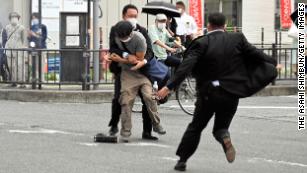Police in Japan have launched a murder investigation into the assassination of former Japanese prime minister Shinzo Abe — but little is known about the suspect who was arrested at the scene of the fatal shooting on Friday.
Abe, 67, was pronounced dead by doctors at the Nara Medical University Hospital, at 5:03 p.m local time on Friday, just over five hours after being shot while delivering a campaign speech in front of a small crowd on a street.
Tetsuya Yamagami, 41, has admitted to shooting Abe, Nara Nishi police said during a news conference on Friday.
An unnamed employee at the dispatch agency who interviewed Yamagami for the job described him as “totally normal,” but added that he “didn’t say much” and “had a slightly gloomy sense to him,” according to the Kyodo News Agency.
He was taken to the Nara District Prosecutor’s Office on Sunday morning, and is being investigated as a “suspect for murder,” according to police.
Yamagami, who is unemployed, told investigators he holds hatred toward a certain group that he thought Abe was linked to, Nara Nishi police said.
Japan’s public broadcaster NHK and Kyodo News Agency have reported that Yamagami also said his mother was involved with the group, citing police.
Police have not named the group, telling CNN they could not provide any information.
According to CNN, Yamagami was described as a “totally normal” and seemingly “earnest” person by at least two people who had interacted with him, Kyodo News also reported.
He was hired through a dispatch agency in October 2020 to work at the freight department of a factory in Kyoto prefecture, the agency reported, citing an unnamed “former senior colleague”.
The former colleague characterized Yamagami as someone who kept to himself.
“If it was work talk, he would respond, but he didn’t go into his private life. He seemed mild-mannered,” the former colleague said, according to Kyodo News. The former colleague added that Yamagami would “eat lunch alone in his car” and that “conversations with him never strayed beyond the topic at hand.”
The former colleague said there had been no issues with Yamagami for the first six months of his employment, until he started to exhibit “gradual neglect” of work practices, according to Kyodo News Agency.
In March, Yamagami started taking “unauthorized time off” and spoke of “heart issues” and other physical problems, despite having no previous issues with punctuality or attendance. His employment ended on May 15, the agency reported.





















